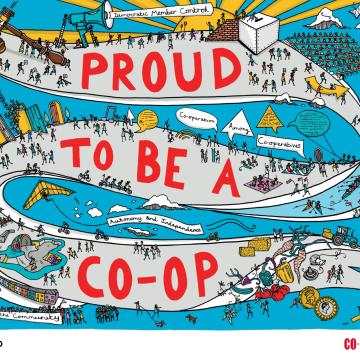Equity really isn’t fair. It’s so much more than that.
Blog post

For World Values Day, we invited ChangeOut – who we are working with currently to better understand Diversity, Equity and Inclusion – to contribute some thoughts on one of the co‑operative movement's core values: Equity.
Time for change
If 2020 doesn’t nudge the co‑operative movement into a more rounded view of equity, what will?
The co‑operative movement is guided by its values. But one of these values – equity – has had an easy ride and needs to be prodded to see what more lies beyond the confines of its typical restraints.
In the co‑operative context, the talk is of putting ‘equity’ into your business to get the best return on your investment. And you’ll be familiar with the more (equity) you put in, the more you get out, and that this should all be ‘fair’.
But that’s a narrow view of equity. It doesn’t question people’s starting points, which will inevitably vary. And it runs the risk that, when equity stretches beyond its investment connotations, it only stretches as far as being ‘fair’ and treating everyone exactly the same.
The truth is that to bring about real equity in the co‑operative movement, you’ll have to treat people differently. You’ll have to remove obstacles in people’s way that stop them joining, or stop them thriving.
Let’s start with the bigger picture first.
Given the nature of co‑operatives, with social and economic justice at their heart, why are there so few black and brown people in co‑operatives?
How do poorer communities fare in joining the movement when they, perhaps more than most, stand to gain a level of security and justice that other economic models and ways of working don’t typically offer them?
Where do those who don’t move in your circles – who perhaps don’t have English as a first language – even start their journey into co‑operatives if none of the original signposting or reality of joining makes that feasible?
So, what does this all mean for the movement’s view of equity?
- It means exploring our own privileges. If you’re able to hear the word ‘equity’ and think investment first, and justice second, is that a privilege?
- It means being pro‑active and reaching out to those people and groups who feel that the movement isn’t for them.
- It means asking yourselves why they don’t feel that the movement is for them.
- It means saying to communities you don’t usually reach: “It’s ok to find out more – the bar is not set so high that you can’t possibly understand how you get to the starting blocks.”
- It means thinking about the language that you use – both literally English, Welsh, Polish, Punjabi – and the perils of speaking in jargon that makes little sense to those not in the know. There’s a danger that the co‑operative movement becomes so narrow and so difficult to understand that you need a PhD to understand it!
- It means acknowledging and supporting the people you work with, or your customers. It means:
- Supporting the person who has come to work having been up all night looking after someone sick.
- Keeping things in the same, familiar places to help the person you work with who lives with dementia.
- It means fixing the dodgy light bulbs straight away, if you know that a colleague is likely to be particularly affected by the flashing lights.
Equity isn’t just about economics, shares and rewarding effort. Equity needs to play out in our words and actions. The big messages and your everyday interactions and decisions.
Maybe you’re thinking you can’t afford to do this. It might take time, money and resource – all things you might not have a lot of right now. I’d argue that you can’t afford not to do it if you are in the business of tackling social injustice. And if the events of 2020 don’t force this change, what will?
Equity really isn’t fair. It’s so much more than that.
Jaz Nannar
Associate, ChangeOut
What are we doing about equity?

Co-operatives UK launches diversity, equity and inclusion review

Diversity equity and inclusion

HR essentials

Co-op values and principles posters
